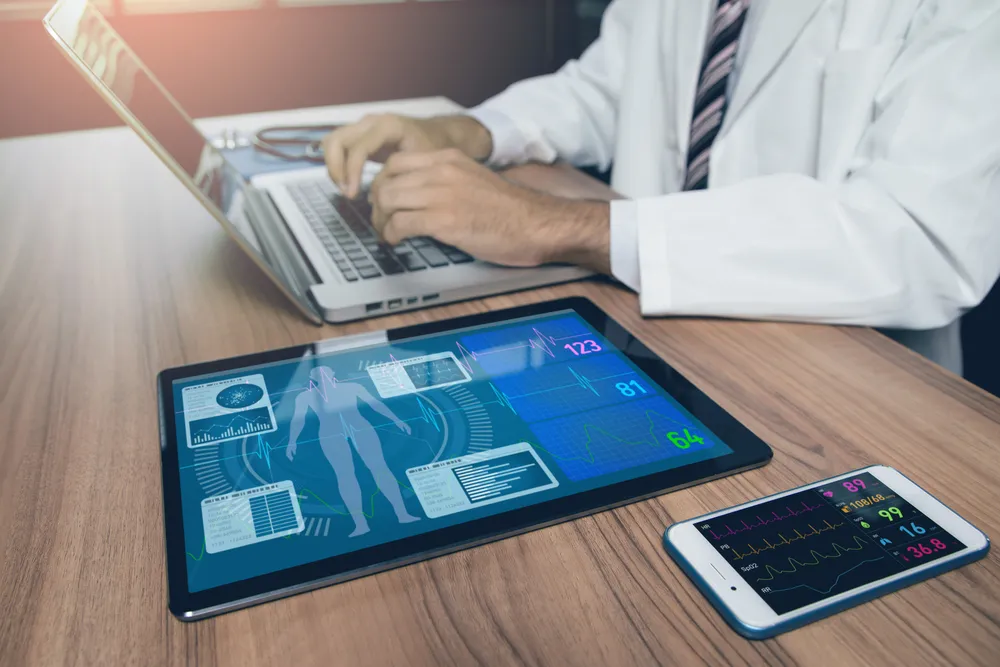PLANO, TX — February 2026 — PracticeEHR has earned recognition as a 2026 FrontRunner for Electronic Medical Records by Software Advice. The FrontRunners report identifies top-performing software products by evaluating...
Medication error is no less than a nightmare for healthcare professionals. The slightest mistake can come bearing grave consequences. Several studies revealed that medicinal error is the 3rd leading cause of death in the USA, a country with one of the best healthcare systems globally. Every one in 10 deaths, or almost 150,000 people per year in the United States, are killed by errors of this nature, costing the industry nearly $20 Billion yearly.
Electronic Health Records (EHRs) have transformed healthcare in many ways, particularly in medication management and error reduction. A good EHR software, especially a cloud-based one, is compelling enough to absolutely eliminate some of the errors of this nature, mainly administrative medical errors.
This article discusses the impact of EHRs in enhancing medication management processes, reducing medication errors, and improving overall patient care. Also, find the bonus of a free demo of the best available EHR System.

What Errors are Categorized as Medication Errors?
Medication errors in the medical industry refer to preventable mistakes related to using medications within healthcare settings. These errors can occur at any stage, from prescription and dispensing to administration and monitoring. Common examples include prescribing the wrong medication or dosage, misinterpreting handwritten prescriptions, administering medication to the wrong patient, or failing to identify potential drug interactions or allergies.
Medication errors can result from various factors, such as miscommunication between healthcare providers, inadequate training, confusing drug names or packaging, or even patient-related factors, such as poor understanding of medication instructions. Such errors can lead to adverse drug reactions, worsening of the patient's condition, prolonged hospital stays, or, in severe cases, fatalities.
How to Avoid and Reduce Medication Errors?
Healthcare professionals and institutions employ various strategies to minimize these errors, including computerized prescription systems, standardized medication labeling, and improved communication among healthcare teams. Additionally, patient education and involvement in the medication process, along with thorough checks and verifications at every stage, play crucial roles in preventing medication errors and ensuring patient safety within the medical industry.
Taking care of all these aspects individually seems quite overwhelming and daunting. However, up-to-date and sound EHR software is capable enough to deal with all of these aspects of practice management and eliminate the probability of error occurrence. For example, PracticeEHR is a practice management software designed for clinicians to manage their patient's medical records. It provides a range of features, such as viewing patient histories, creating new prescriptions and refilling old ones, ordering lab or radiologic tests, and receiving results electronically. In addition, clinicians can communicate with patients through secure messaging and access billing information for insurance claims. These are just a few examples of features that PracticeEHR offers.
How Does EHR Software Help to Reduce Various Medical Errors?
From several, here are 6 six salient ways EHR software contributes to minimizing these errors, ensuring safer and more efficient patient care.
1. Enhanced Medication Management
One of the critical areas where EHR software plays a pivotal role is in medication management. It helps healthcare professionals track a patient’s medication history, allergies, and potential drug interactions, allowing for informed medication prescription decisions. Through real-time updates and alerts, EHR systems help prevent medication errors, such as incorrect dosages or drug contraindications, significantly improving patient safety.
2. Accurate Documentation and Accessibility
EHR software ensures accurate and detailed documentation of patient records, including medical history, test results, and treatment plans. This centralized database is accessible to authorized healthcare providers, enabling them to make well-informed decisions promptly. By eliminating the reliance on paper-based records that are prone to errors and often difficult to decipher, EHR systems contribute to a higher level of accuracy in patient care.
3. Decision Support Tools
EHR software integrates sophisticated decision support tools that assist healthcare professionals in diagnosing conditions and prescribing treatments. These tools analyze vast amounts of medical data, providing evidence-based recommendations for diagnosis and treatment options. By relying on these data-driven insights, healthcare providers can significantly reduce diagnostic errors and ensure patients receive appropriate care tailored to their needs.
4. Streamlined Communication and Collaboration
Effective and efficient communication/collaboration among healthcare providers is paramount in preventing medical errors. EHR software facilitates seamless communication by enabling instant sharing of patient information among different departments and specialists. Timely exchange of critical information, such as test results and medical histories, ensures that all team members are well-informed, minimizing the chances of misunderstandings and errors in patient management.
5. Patient Engagement and Education
EHR systems empower patients to participate in their healthcare journey actively. Through secure patient portals, individuals can access their medical records, review treatment plans, and understand their medications better. Educational resources and personalized health information provided through these portals enhance patients’ understanding of their conditions and treatments, reducing the likelihood of errors caused by misunderstanding or non-compliance.
6. Continuous Monitoring and Alerts
EHR software monitors patients’ vital signs and lab results in real-time, triggering alerts for healthcare providers if any values fall outside the normal range. These proactive notifications enable timely intervention, preventing adverse events such as sepsis or organ failure. By continuously monitoring patients, EHR systems enhance patient safety and reduce errors related to delayed responses to critical medical conditions.

PracticeEHR - The Ultimate Medication Errors Reduction EHR Software!
Practice EHR stands out as the ultimate solution in Electronic Health Record (EHR) software designed to address and reduce medication errors. With its advanced features, PracticeEHR ensures precise medication management by providing comprehensive tools to track patient medication history, allergies, and potential interactions. The platform’s robust decision support tools offer evidence-based insights, aiding healthcare professionals in accurate diagnosis and treatment planning, thereby minimizing diagnostic errors.
PracticeEHR also promotes seamless communication and collaboration among healthcare teams, facilitating the instant sharing of vital patient information and test results. By actively engaging patients through secure portals & educational resources, PracticeEHR enhances patient understanding, reducing errors caused by miscommunication or lack of awareness.
Furthermore, the software's continuous monitoring and real-time alerts feature enables swift intervention, preventing adverse events and ensuring patient safety. PracticeEHR emerges as the ultimate choice for healthcare providers, offering a comprehensive, user-friendly, and technologically advanced solution to reduce medication errors and enhance overall patient care significantly.
Conclusion
In conclusion, Electronic Health Record software is a cornerstone in pursuing safer and more efficient healthcare. EHR software significantly reduces medical errors by addressing the complexities of medication management, ensuring accurate documentation, providing decision support tools, fostering communication and collaboration, engaging patients, and implementing continuous monitoring. Embracing these technological solutions enhances patient safety and improves the overall quality of healthcare services, marking a transformative leap toward a safer, error-free healthcare future.
If you want to explore the features of PracticeEHR without any cost, request a FREE Demo now!!
Topics: Patient Care, EHR Solution, New Technology, digital age, Industry Update, Medical Billing, Practice Automation, EHR, EHR Features, ePrescribing
RECENT POSTS



TOPICS
- EHR Solution (193)
- EHR (127)
- digital age (120)
- Patient Care (117)
- Medical Billing (112)
- Specialty-Specific EHR (112)
- Industry Update (98)
- Technology in Healthcare (84)
- EHR Features (79)
- Small Practice (78)
- Medical billing services (74)
- Integrated EHR (64)
- RCM (64)
- HIPAA Security (62)
- Cloud-based EHR (44)
- New Technology (44)
- Telemedicine (44)
- Healthcare Office Management (40)
- Practice EHR News (40)
- Kiosk (31)
- Revenue Cycle Management (28)
- AI Solutions (26)
- ePrescribing (21)
- AI Scribing (17)
- Best EHR Software (17)
- Practice Management Software (13)
- AI EHR (12)
- AI-powered Medical Billing (12)
- EMR (12)
- TeleVisit (12)
- AI Scribe (11)
- Practice Automation (11)
- Client Favorites (10)
- The ONE (10)
- AI scanning (9)
- Switching to New EHR (9)
- Urgent Care (9)
- Best EHR Practice (8)
- EHR Integration (8)
- MACRA/MIPS (8)
- Patient Portal (8)
- Psychiatry EHR (8)
- Medical Practice Management Software (7)
- Automated Health Tools (6)
- E-Prescribing (6)
- Product Updates (6)
- events (6)
- MIPS (5)
- Mobile EHR (5)
- Telehealth Platforms (5)
- Family Medicine EHR (4)
- HIPAA (4)
- Insider (4)
- Integrated Practice Management (4)
- Internal Medicine EHR (4)
- MIPS Reporting (4)
- Multilingual AI Scribe (4)
- Orthopedics EHR (4)
- Podiatry (4)
- Podiatry EHR (4)
- Regulatory Updates (4)
- Telehealth Platform (4)
- Automated EHR (3)
- Chiropractic EHR (3)
- Digital Experiences (3)
- EHR Flaws (3)
- EHR Implementation (3)
- EHR for Chiropractors (3)
- EHR for Small Practices (3)
- Eligibility Verification in Medical Billing (3)
- Medical Coding Services (3)
- Patient Check-in Kiosk (3)
- PracticeEHR GO App (3)
- AI Scan (2)
- Cash Flow (2)
- Cashless Payments (2)
- Clearinghouse (2)
- Dermatology EHR (2)
- EHR Scheduling (2)
- Family Medicine (2)
- Foot and Ankle Care (2)
- Foot and Ankle EHR (2)
- Health records 101 (2)
- Healthcare Compliance Certification (2)
- Medical Billing Partner (2)
- Medical Credentialing (2)
- Pediatrics EHR (2)
- Quality of Patient Care (2)
- Reporting Under MIPS (2)
- Risk and Liability in Medical Settings (2)
- Voice-Activated AI Scribe (2)
- What Works Clearinghouse (2)
- ACA Subsidy (1)
- AI Scribe for Pediatric Care (1)
- Bariatric EHR (1)
- Behavioral Health Practices (1)
- Billing Communication (1)
- Billing for Private Practices (1)
- Cardiology EHR (1)
- Charting (1)
- Data Security (1)
- Dos and Don'ts (1)
- EHR Dashboard (1)
- EHR Guides (1)
- EHR KPIs (1)
- EHR Questions to Ask (1)
- EHR Transition (1)
- EHR for Chronic Illness (1)
- EMR vs EHR Difference (1)
- ENT EHR (1)
- Endocrinology EHR (1)
- Gastroenterology (1)
- Gastroenterology EHR (1)
- General Surgery EHR (1)
- Geriatric AI scribe (1)
- Geriatrics EHR (1)
- Guides (1)
- Healthcare Practice Office Management (1)
- Help Center Videos (1)
- Insurance Reimbursement (1)
- KPI (1)
- Key Performance Indicators (1)
- Lab Processing (1)
- MACRA (1)
- Nephrology EHR (1)
- Neurology EHR (1)
- Pain Management EHR (1)
- Patient Behavior (1)
- Pediatric Care (1)
- Physical Therapy EHR (1)
- Practice Cash Flow (1)
- Practice Efficiency (1)
- Pulmonology EHR (1)
- Reconsider Your EHR (1)
- Simplify Practice Management (1)
- Staffing in Healthcare (1)
- Switch Medical Billing Providers (1)
- Urgent Care Medical Billing (1)
- Urology EHR (1)
- insurance claim denials (1)








